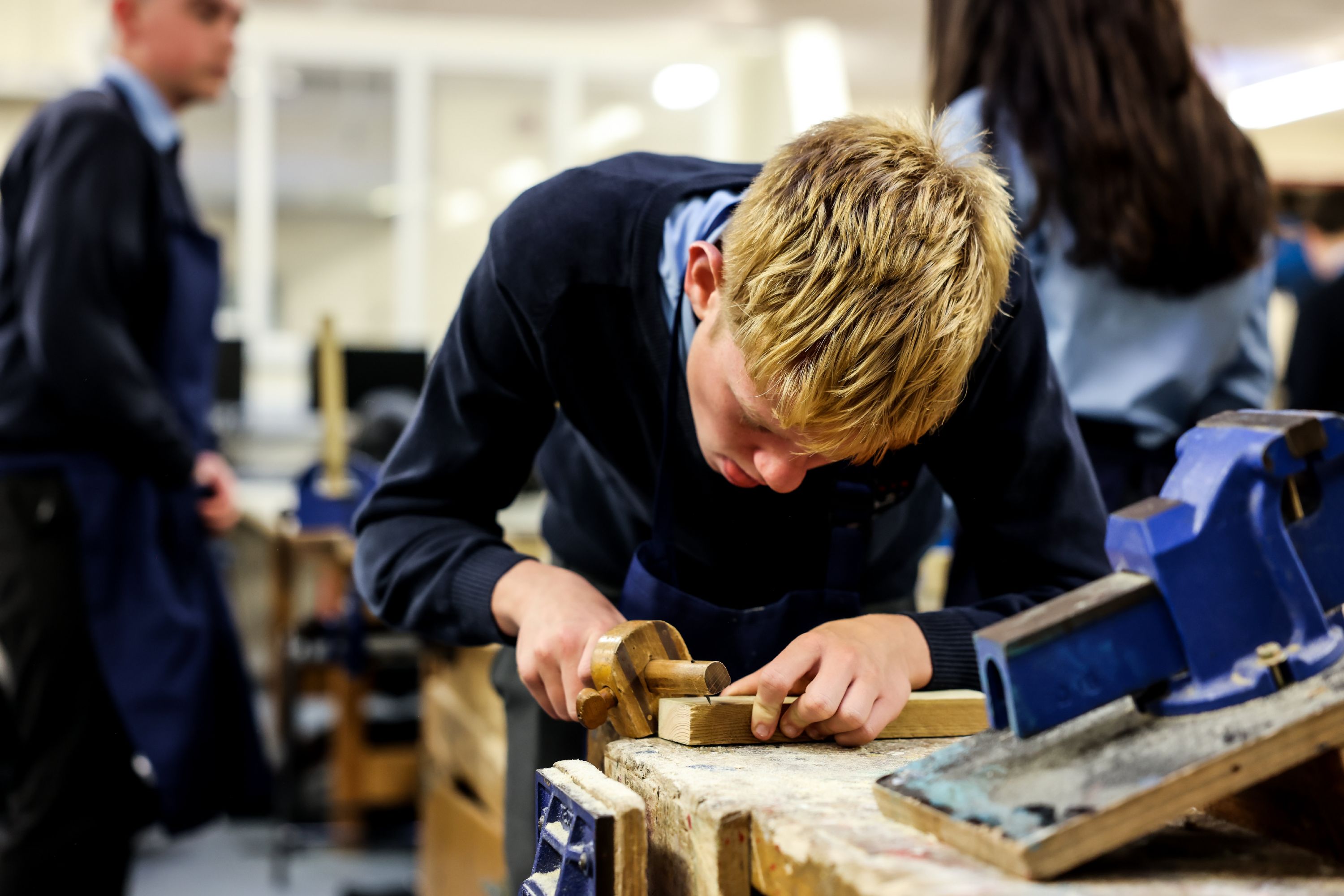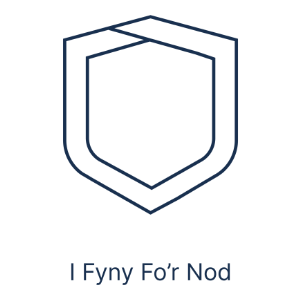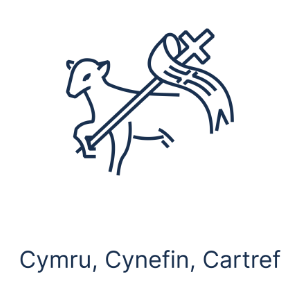DT Key Stage 4
The Design & Technology Department offers a wide range of courses in Key Stage 4:
- DT Production Design/Dylunio Cynnyrch GCSE
- DT Fashion and Textile GCSE
- Constructing the Built Environment Level 1/2 Award
- Hospitality BTEC Level 1/2 Award
Product Design/Dylunio Cynnyrch
Design and Technology - Product Design
Dylunio a Thechnoleg - Dylunio Cynnyrch
Which teacher(s) should I see if I want more information about the course?
Mrs. Barnard, Mr. James or Mr. La Trobe
What course will I be following?
GCSE in Design and Technology - Product Design (WJEC)
What kinds of things will I study?
Through studying Design and Technology you will become better prepared to thrive in an increasingly technological world. You will gain awareness and learn from wider influences on Design and Technology including historical, social, cultural, environmental and economic factors. You will also get the opportunity to work creatively when designing and making and apply technical and practical expertise.
You will learn the core technical and designing and making principles, including a wide range of design processes, materials, techniques and equipment. You will also have the opportunity to study specialist technical principles in greater depth.
How will my work be assessed?
50% of your marks will come from a 2 hour written examination paper sat at the end of Year 11.
50% of your marks will come from a non-examined assessment consisting of a single design and make activity selected from a range of tasks set by the examination board (this process takes place over approximately 35 hours) and takes place in Year 11.
How can I progress my learning in this subject after Year 11 and is this the course for me?
Product Design will help to develop your skills and capacity for imaginative, innovative thinking, creativity and interdependence. The problem solving skills developed through the study of Product Design are highly valued by employers.
As a designer you will solve a design problem by Investigating, Designing, Modelling, Testing and Evaluating a final design proposal/product.
To be successful in Product, you need to be committed, creative, artistic, motivated, a problem solver and most importantly, be interested in all aspects of the subject and not just making.
We do offer A Level Product Design here in the Sixth Form at Dyffryn Taf, where you will get a chance to further develop your knowledge skills and understanding of the topics you will have covered at GCSE.
If you want to pursue a career in Product Design after A Level, you can go on to university to study either a BA (Hons) Product Design course which is the creative side of product design; or BSc (Hons) Product Design which is the technical side of product design. There are plenty of other courses available such as Architecture Transport Design, Furniture Design, Product Design Engineering, Product Design and Innovation to name but a few.
If you are considering a career in any of the following: engineering, manufacturing, construction, design, architecture, electronics, robotics, education, pneumatic, hydraulic, environmental, architecture (amongst others) you may want to consider studying a Design and Technology subject. It is a great pathway to a wide range of further opportunities.
DT Fashion and Textile GCSE
DT Fashion and Textile GCSE
Which teacher(s) should I see if I want more information about the course?
Mrs. Barnard
What course will I be following?
GCSE Design and Technology - Fashion and Textiles (WJEC)
Fashion and Textiles Specification
What kinds of things will I study?
In this Fashion and Textiles subject you will study four main areas of content:
1. Core knowledge and understanding.
2. In-depth knowledge and understanding of fashion and textiles.
3. Core Skills.
4. In-depth skills in fashion and textiles.
In Year 10 you will mainly focus on textile skills and will consist of a series of mini projects/focused tasks to build upon your skills and confidence. You will learn how clothing is made and construction methods, important factors when choosing materials and components and the techniques used to add colour, pattern and embellishment to fabric.
This year will also involve learning the core knowledge of six topic areas, enabling you to be knowledgeable of up-to-date technologies in this industry.
How will my work be assessed?
Year 11 will see you continuing to reinforce your knowledge of the theoretical aspects of the course, but the main focus will be the design and make task (a Non Examined Assessment or NEA that takes up to 35 hours). At this stage you will have the subject knowledge and skills to design and make fashion items of your choice as part of your coursework project which equates to 50% of the qualification. This is your chance to show your creativity and flair whilst making high quality products aimed at your target market.
At the end of Year 11 you will sit a 2 hour exam which is the remaining 50% of the overall grade.
How can I progress my learning in this subject after Year 11 and is this the course for me?
Are you creative and imaginative? Do you enjoy exploring ideas and looking at things in different ways? Do you enjoy making?If so, you should consider a GCSE in Fashion and Textile. You will enjoy developing your understanding of the visual world, learning practical skills and responding to ideas and issues in ways that are personal to you.
Through studying Fashion and Textiles, you will be involved in the creation, selection, manipulation and application of a range of materials such as fibres, yarns and fabrics, and processes such as weaving, knitting, stitching and printing to create designs and products. Textile designers work in a variety of ways to create ideas, materials and techniques for different applications. Textile designers also play an important role in the world of fashion, theatre, performance and retail.
Through studying this GCSE you will learn to; apply a creative approach to problem solving; consider and develop original ideas from initiation to the final product; analyse your own work and the work of others; express individual thoughts and choices confidently; take risks, experiment and learn from your mistakes.
Unfortunately, at the moment, we do not offer Fashion and Textiles as an option in the Sixth Form at Dyffryn Taf, but there are some post-16 colleges that do run A-level and other Level 3 courses linked to this area.
Constructing the Built Environment Level 1/2 Award
Constructing the Built Environment Level 1/2 Award
Which teacher(s) should I see if I want more information about the course?
Mr. La Trobe or Mr. James (D&T Department)
What course will I be following?
Level 1 or Level 2 Award in Constructing the Built Environment (WJEC)
What kinds of things will I study?
The Construction qualification we offer at Dyffryn Taf will provide you with the opportunity to learn all about different careers within the Construction industry and also provides a useful look into the planning, the materials, and the construction techniques of buildings, looking at all aspects of the building from the foundations up to the roof structures. Construction will do more than just show you what it means to work in the construction industry. It will give you the chance to apply your knowledge in the context of work-related situations. The course is broken down into three main areas:
- Safety and security in the world of construction (externally assessed); how to keep yourself and others safe in the workplace. In this unit you will gain knowledge and understanding in how to comply with various Health and Safety legal requirements for working in the Construction industry. You will also gain knowledge and understanding in how to plan for minimising risk to your own and others health and safety in Construction.
- Practical construction skills (internally assessed). This will involve interpreting information and then planning the refurbishment of a building. You will also have to use specific skills and techniques to carry out the refurbishment.
- Planning construction projects (internally assessed). Again using your practical skills (which we will teach you) you will plan and carry out built environment development projects.
How will my work be assessed?
Through a combination of exam and coursework:
Unit 1 - Safety and Security will be assessed via a written exam (1 hour). This will be worth 25% of your overall grade.
The other 2 units combine planning and practical work. This is the non-examined assessment and is worth 75%
How can I progress my learning in this subject after Year 11 and is this the course for me?
Whilst we don’t currently offer Construction here at Dyffryn Taf in the sixth form, there are Level 3 courses in Construction available at local Sixth Form Colleges. This is a really useful qualification if you are thinking about maybe an apprenticeship when you leave school.
As well as practical construction skills, this subject will teach you a range of transferable skills such as teamwork, communication, critical thinking and problem-solving. These skills are in high demand across all professional sectors.
Are you looking for a subject that you can connect to “real life” easily? Do you prefer more practical subjects? Are you quite creative? Do you like working with your hands? Do you like solving problems? Do you see yourself one day working as a carpenter, plumber, electrician, kitchen fitter, highway maintenance worker, civil engineer or any other profession in the construction industry? If the answer to these questions is yes, this qualification could well be for you.
Hospitality BTEC Level 1/2 Award
Hospitality BTEC Level 1/2 Award
Which teacher(s) should I see if I want more information about the course?
Mrs. Barnard
What course will I be following?
Level 2 First Award in Hospitality (BTEC)
What kinds of things will I study?
In Unit 1 you will get a detailed introduction to the hospitality industry, exploring all the different aspects that make up the hospitality sector. You will also be introduced to the business aspect of hospitality and all the different services and products it provides.
In unit 2 you will get the opportunity to explore the importance of working as part of a team as well as exploring the different types of jobs that are needed within the hospitality industry.
In Unit 3 you will learn about food safety as well as more general health and safety requirements within the hospitality sector. You will learn about the importance of following the correct procedures to maintain food safety. You will also learn about the right way to maintain food safety when storing, preparing, cooking and serving food. Much of this work is based on practical work.
Unit 6 then is all about planning, preparing, cooking and finishing food. This is the practical part of the course where you will get the opportunity to develop the skills required to plan, prepare, cook and finish a range of different foods. You will learn how to select and prepare ingredients and how to plan a two-course meal. You will also learn about the tools and equipment used to prepare, cook and finish food.
How will my work be assessed?
Unit 1 will be externally assessed via an examination paper (1 hour 15 minutes).
The other three units will be assessed internally by your subject teachers via coursework and practical assessments.
How can I progress my learning in this subject after Year 11 and is this the course for me?
We do offer Hospitality here in the Sixth Form at Dyffryn Taf, where you will be able to gain a Level 3 qualification (think of this as an A-level equivalent). This will allow you to build on the knowledge, skills and experiences gained at Level 2.
It is a great qualification to have if you have a passion or interest in food and see yourself one day maybe working in the hospitality industry (some examples include chef, restaurant/bar/cafe/hotel manager, barista) or it could be a gateway to food related professions such as food scientist, a nutritionist, a dietician, a home economist, a food technologist, an engineer, technician in food marketing or a teacher. In the future you may wish to set up a business producing food products.
You might find this course really useful if you simply want to develop some essential life skills that will allow you to understand how to prepare and cook meals for yourself or others in the future.



